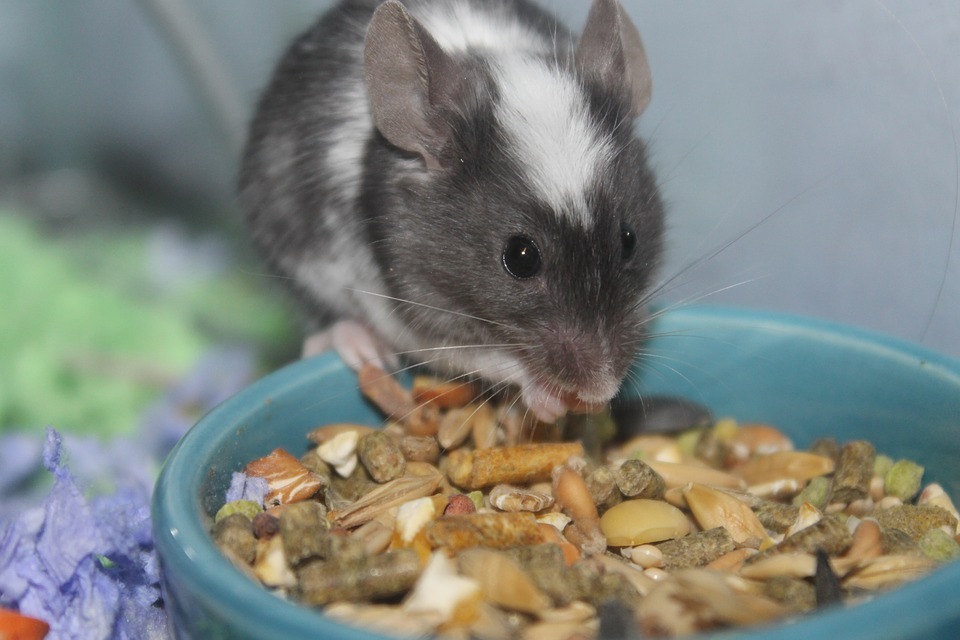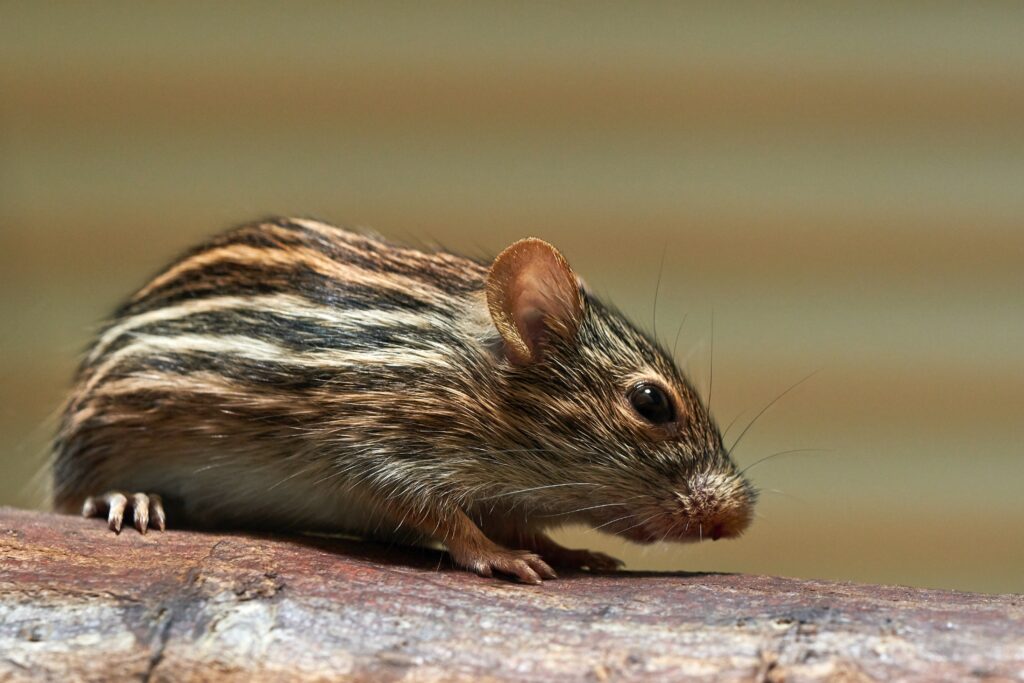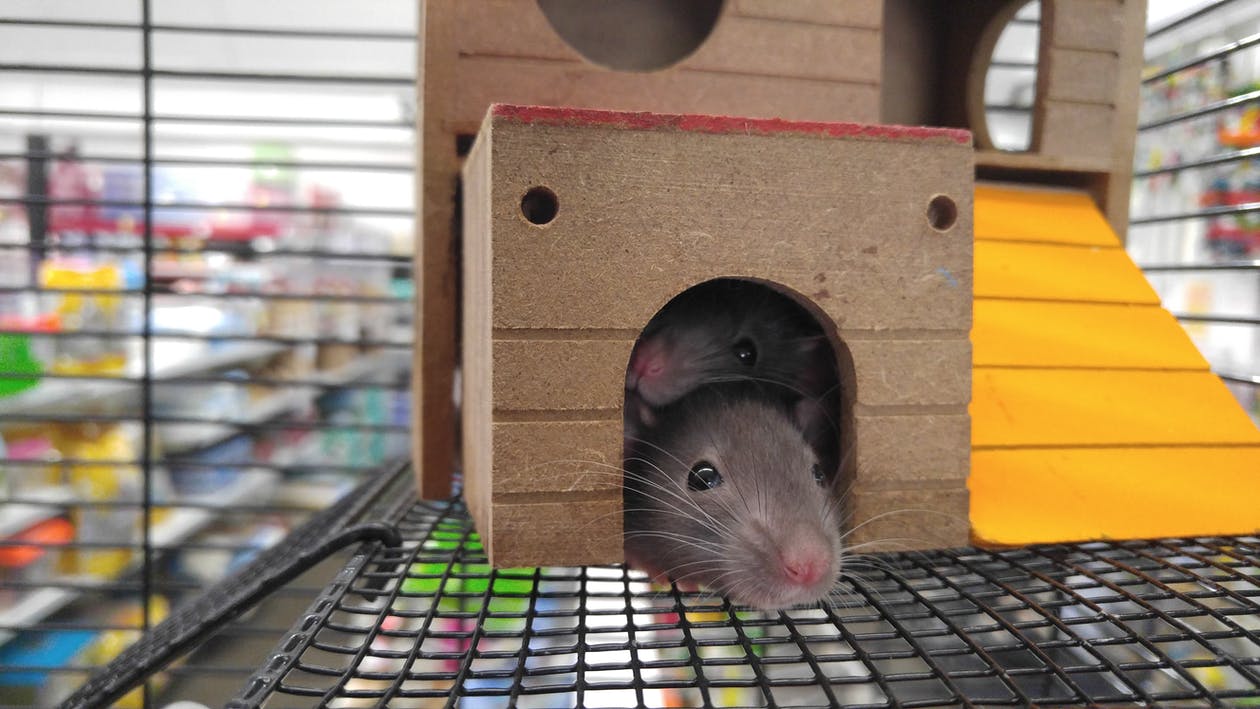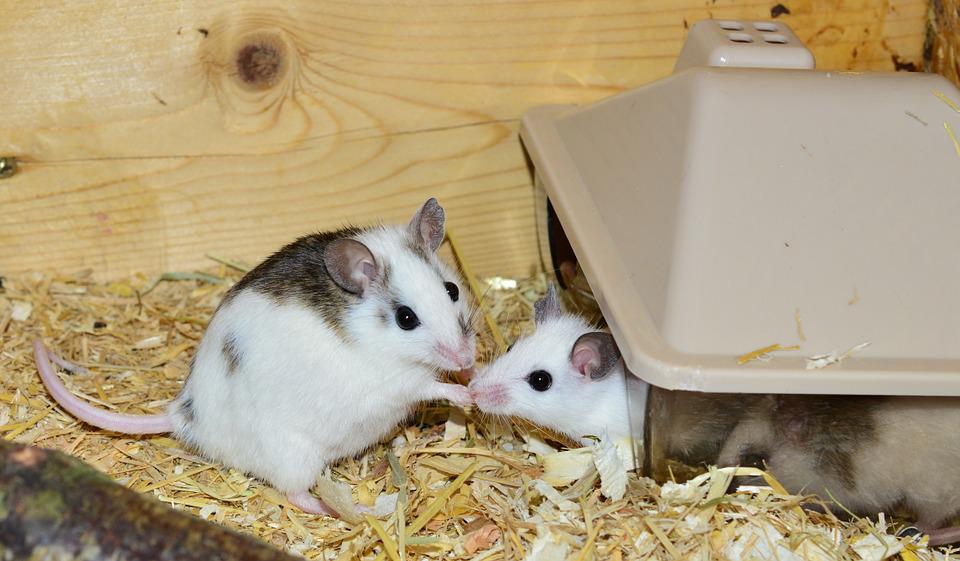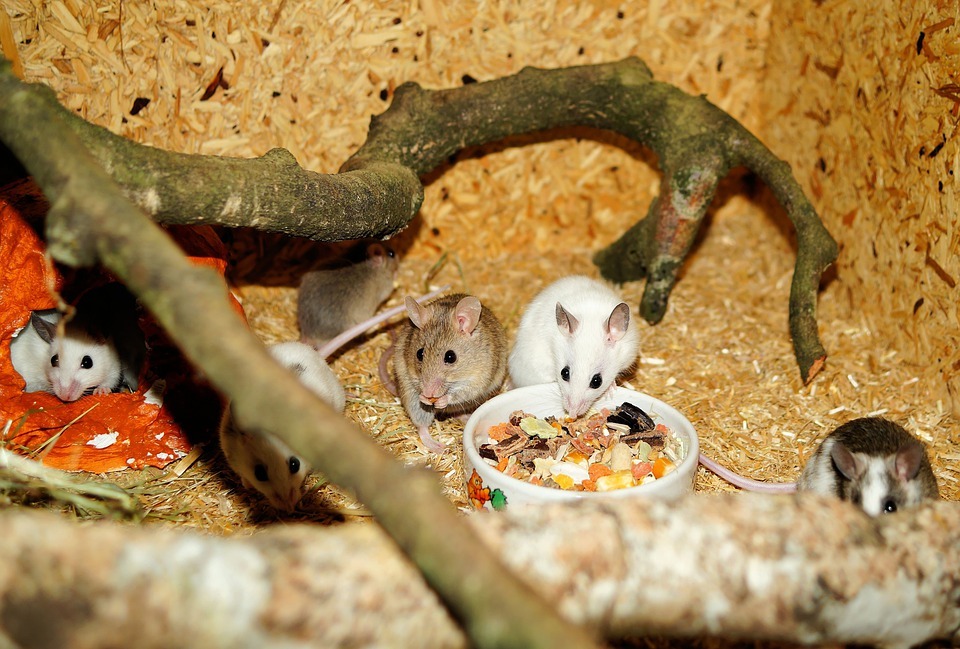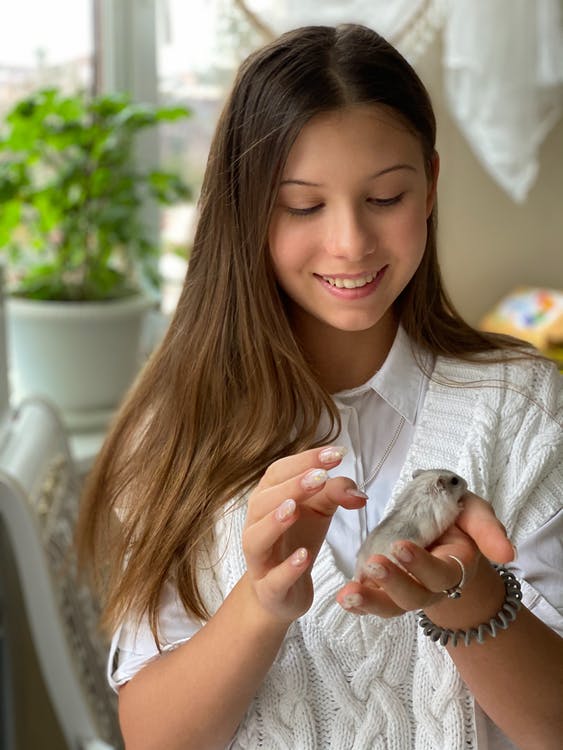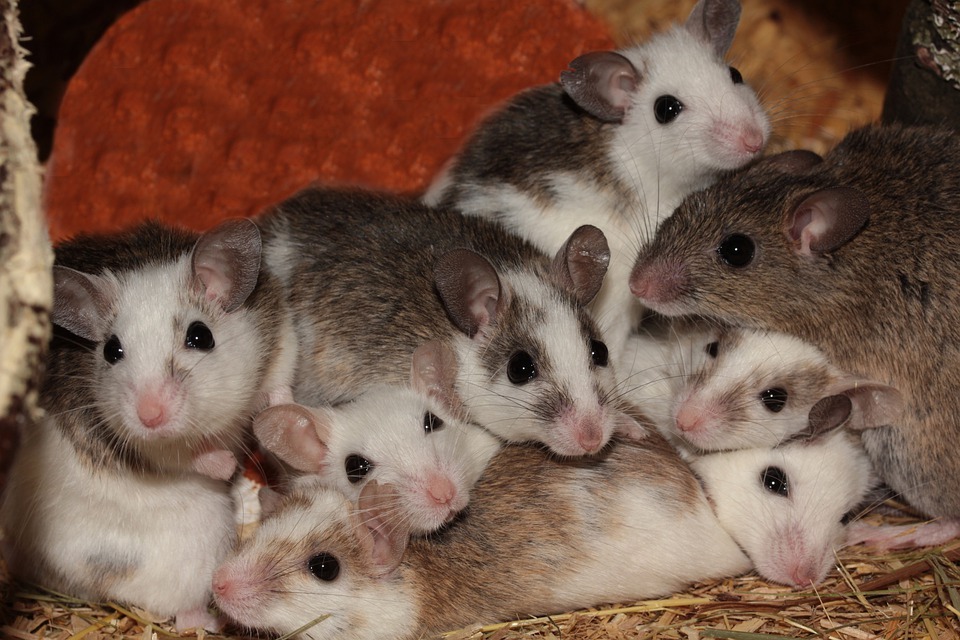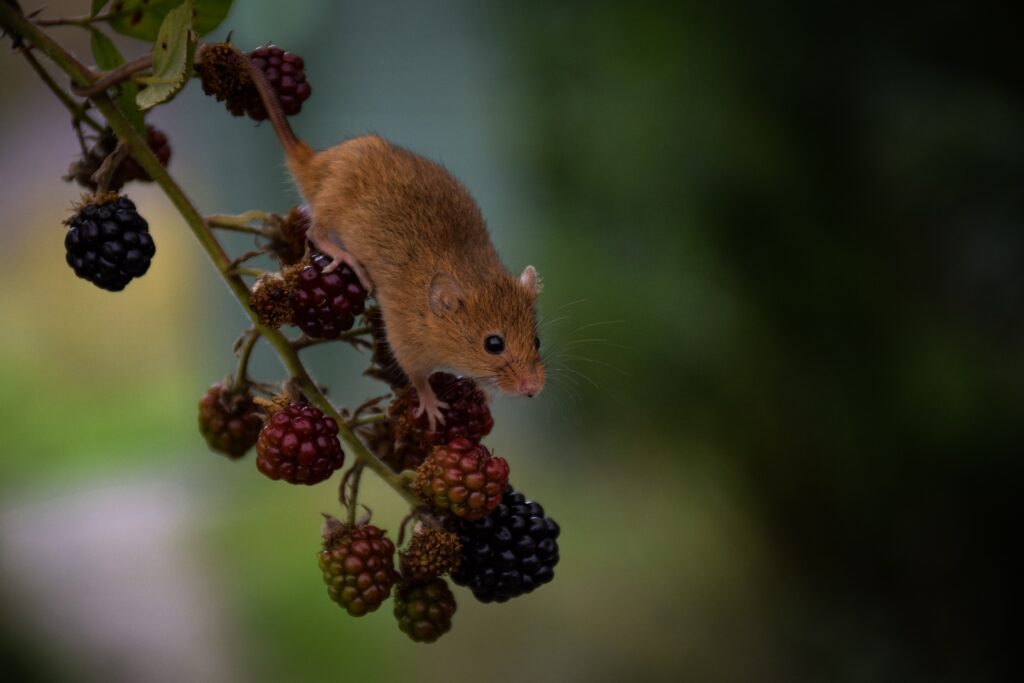Pet mice are fun, easy to care for, and low maintenance. Small enough for a studio apartment, and they make great companions. However, they are shy and tougher to handle than larger rodents like rats, but they can learn to be comfortable with handling if domesticated young. Mice have short, colorful fur as pets. Round ears and a long tail lack fur. As nocturnal animals, mice are active at night and sleep during the day. Quality rodent food and habitat cleanings are needed for their care. Before getting a pet, learn its needs, so you know what to expect.
Different Types of Mice
Mice are popular among pet owners because they are cute, clever, and available in various breeds. If you want to keep one as a pet, there are several species of mice to pick from, and each has its own quirks and personality.
1. Self-Mice
The first distinguishing feature of a Self-Mice is its uniform plain color. One of the many mice that fit under this category is an all-black variety. They have black eyes to match their black fur. One unique aspect of black mice is that, unlike black rats, they retain their original dark coat color as they age. On the other hand, the chocolate mouse has uniformly brown fur that looks like milk chocolate. Lilac and Dove are the names given to blue-colored strains of the Self mouse. This group also includes mice that are entirely white or bluish-gray. Ginger, fawn, and champagne mice are typical variations of the Self mouse breed.
2. Tan Mice
Tan mice can have various other colors in their fur, but their bellies are always a vivid orange or ginger. A black-and-tan mouse, for instance, is adorable in an orange contrast. There are so many kinds of tan mice you can wind up with something unique. Color differences in this group are much more varied than those seen in marked fancy mice.
3. Fox Mice
The only noticeable characteristic of this variation from the Tan mouse is that their bellies are white instead of brown. While the top can be practically any color, the bottom is usually white or very close to it. If you’re lucky, you’ll find one with a ginger or reddish-brown cap, making it look like a miniature fox. The underbelly is all white, including the jawline.
4. Marked Mice
Marked mice come in a wide variety of colors and patterns. The Dutch species is well-liked because of its two dark patches over each eye, which stand out against its otherwise solid fur. Banded mice, for instance, are colored mice that have white belts across their backs. The Rump white is another well-liked marked mouse, with distinctive coloration extending from the shoulders to the hips. Tricolored mice may resemble Tan mice at first glance. Still, a closer inspection reveals a third coloration on either the mouse’s belly or its back. These mice are tricolored, with spots of not one or two but three distinct colors.
5. Fancy Mice
Most mice kept as pets are the fancy mice variety. They’re cute since they’re petite and friendly and can come in various coat colors and patterns. Active and social, fancy mice like interacting with one another. They do best when kept in pairs or small groups.
6. Pygmy Mice
As pets, pygmy mice are endearingly tiny, sociable rodents. They are playful and energetic, making them perfect family pets. Pygmy mice need lots of exercise and stimulation but can only live in a relatively tiny cage.
7. Hairless
Mice can be classified as hairless, depending on how much of their fur is absent. This is determined by a mice’s genetic makeup, which can make them utterly bald in patches, hairless except for a few curling whiskers, etc. There are potential health risks with hairless breeds. They are more likely to get eye infections since they don’t have eyelashes to protect them. It can be difficult for a mouse to remove dust and dirt between its hairs if its fur is tightly curled, leading to skin discomfort.
8. Astrex and Frizzie/Rex
Curly hair is characteristic of Astrex and Rex/Frizzie mice. If their eyelashes are short or extremely curly, they are just as susceptible to eye infections as hairless mice. The whiskers of both bald and long-haired mice are curved. Like many other animals, mice use their whiskers to gather information about their environment and navigate. Having missed or curling whiskers increases the likelihood of experiencing sensory impairment.
9. Satin
The fur of a satin mouse is gleaming. Sometimes, the only way to tell if a mouse is a satin is by looking at its stomach hair because the metallic effect is more noticeable in some colors than others. Hollow hairs are responsible for the effect, altering the fur’s light reflection properties.
10. Longhair
As the name suggests, longhair mice have longer fur. The coat is typically light and fluffy but can be slightly sparser at times. It is possible to have multiple coat types, such as curly satin longhair. The mouse can puff up their coat such that it stands on edge when they are upset or ill. Several of the different colors mice come in look more distinct in a normal coat, so they shouldn’t be dismissed as dull just because they have a uniform appearance.
Tips for Owning and Caring for Mice
1. Give pet adequate space
Mice are small, but they need space to move around. The size of the cage depends on how many mice you keep. Wire cages give better ventilation, but you must ensure your mouse can’t fit through the bars. Multiple-level horizontal bars and cages are suitable for climbing. Avoid cages with wire floors; mice prefer solid flooring. The mice cage should have a nest box or other shelter where mice can feel safe.
2. Avoid direct sunlight and drafts
Mice are sensitive to heat. Avoid placing your cage in direct sunlight if you use a glass tank. The glass walls might trap heat and overheat your pet. Keep the cage out of drafts and open windows on cold days and nights; mice are sensitive to extreme temperatures.
3. Provide your pet mice with toys
Pets might get bored if they have nothing to do. Mice are easy to please. They enjoy chewing and climbing, so you can customize their toys, such as making a DIY hamster wheel, which is essential for mice exercise. You may add cardboard tubes and tiny boxes to the cage for your pet to hide and climb. Also, give your mouse something to munch. A stick can help dull their sharp teeth.
4. Make sure to discard old food every day
Daily cage checks are necessary because rodents stockpile food. Pellets and seeds are fine, but fresh food might go stale or moldy and make your pet sick. Look for extra food hidden in toys and bedding piles.
5. Make sure the cage is always clean
Pet hygiene is vital for their health. Replace all bedding once a week to avoid health issues. Buy bedding at a pet store to avoid utilizing dangerous materials. The entire cage should be cleaned with mild soap or disinfectant to remove grime when the bedding is changed.
6. Provide food and water 24/7
Your pet should constantly have food and water. A water bottle can replace a water dish because mice tip it, drenching their bedding and themselves. Your pet’s food dishes and water bottles should be cleaned every day. Follow the package label and ask your vet how much to feed. Mice graze during the day and might even wake up during their sleeping hours for a snack. Always keep a bowl of food in their environment, throw out uneaten food after 24 hours, and refill the bowl. You can feed your mouse seeds, grains, fruits, and veggies.
7. Train and spend quality time with your pet mice
Quality time is crucial to caring for your pet mouse. Bonding can involve letting your pet run over your hands or using incentives for training. Spending time with your pet will bring you closer together. To tame mice, spend time around their enclosure, so they’re accustomed to you. Offer millet or sunflower seeds by hand. This typically leads to mice wandering your hands, where they can be picked up. Try scooping a mouse by cupping your hand under it, but don’t squeeze or tightly grab its body.
8. Give out treats for your mice pet
Sometimes you may want to give your pet a treat such as sunflower seed, or a little cheese can win your rodent’s trust. Then it might be a reward for good behavior.
9. Provide good exercise for your mice
Physical activity prevents obesity and other health concerns in mice. They should be active if you offer a large enclosure with an exercise wheel. You can also give them out-of-cage time in a secure place, such as a kiddie pool. However, when mice are out of the cage, keep an eye on them.
10. Maintain grooming
Mice are clean, grooming animals, they don’t need to be washed, but they may need aid with dental care. Mice’s teeth grow continuously throughout their lives and wear them down through gnawing. Sometimes you may ask a vet to trim overgrown teeth.
Recommended Food for Mice
While cheese may be the first thing that comes to mind when people think of mice, we know that mice need a varied diet to thrive. Because of their omnivorous diet requirements, mice require a wide range of nutrients. If you feed your pet mouse the right food, you can increase the likelihood that it will live a long and happy life. Protein, commercial mice food, veggies, snacks, and clean water are all essential components of a healthy diet for mice.
When it comes to feeding your pet mice, remember that quantity matters. Depending on their size, adjust the amount of food you give them. Before giving your pet mouse a treat, ensure it has its usual nutritious food. Healthy snacks for your mouse are plentiful, but keep serving sizes small. Mice enjoy a variety of foods, including blueberries, bananas, celery, broccoli, and peas. To keep your pet healthy and happy, you should not feed it anything poisonous, like chocolate or grapes. Here are some of the recommended safe foods you can provide your pet mice.
1. Rat-and-mouse pellets
Mice can get all the vitamins, minerals, protein, and other vital nutrients they require from pellets or blocks made especially for them. They provide most of the nutrients a mouse needs to stay healthy and help trim your mouse’s teeth.
2. Fruits
Your mouse can choose from a wide variety of tasty fruits. However, fruits should be given to a mouse on rare occasions because of their high sugar content. Although fruits have many health benefits, a diet heavy in fruit can lead to diarrhea and insulin issues in mice. Pears, melons, plums, blueberries, strawberries, blackberries, apples, and bananas are just a few fruits that mice enjoy eating.
3. Vegetables
Mice enjoy fiber much and prefer to consume fiber-rich food. Therefore, make sure your mouse always has access to fresh vegetables, such as carrots, peas, broccoli, turnips, cauliflower, cabbage, cucumber, chicory, sweet peppers, peas, brussels sprouts, bok choy, spinach, parsley, celery, tomatoes, and a variety of herbs and spices.
4. Meat/Dairy
Meat, like fruit, is too high in calories for a mouse. They shouldn’t be fed large amounts of meat, and scraps should be limited. Mice should only be given lean meats since they can develop gastrointestinal problems from consuming too much fat. Eggs, milk, cheese, poultry, meat, and pork are some meat and dairy you can give your pet mice in a limited amount.
5. Small Insects
Do not be alarmed if your mouse starts digging holes in the yard or catching crickets and grasshoppers if you ever let it play outside. Mice are scavengers that live in the forest and will eat almost anything. Small insects are among their favorite foods.
Something To Think About Before Getting a Mouse Pet
Do some research before buying a mouse. Learn about breeds, housing, feeding, and general care. Knowing more before buying a pet will make you more prepared. Start with weighing the benefits and downsides of having a pet mouse.
One obvious good thing about having a mouse is its entertaining and affectionate nature. Once socialized, mice are energetic and interactive. They entertain their owners and enjoy giving and receiving kisses. First-time pet owners will be surprised by a mouse’s intelligence and alertness. They love to investigate and even explore their owner’s hand or knapsack.
Most importantly, children love mice as pets. They’re participatory, peaceful, and fun. They’re lovely for teaching kids about the world. They are also safe to be around kids; they can play without getting wounded or bitten. If a child accidentally feeds them something they shouldn’t, lets them out, or makes other catastrophic blunders, you can teach lessons without the high cost of other pets.
Additionally, mice are cheap to adopt and maintain. Due to their tiny appetites, food is not a considerable expense, and a sturdy metal box, bedding, and wheel only need to be bought once. More chew toys or treats will be purchased, but they’re cheap.
They are also space-friendly; unlike other pets, they’re multicolored and furry and fit in your pocket or purse. They won’t need much space if you let them play outside. What makes them a fantastic pet makes them a popular choice for medical trials and investigations. As pets, they can play activities like chase-the-treat and retrieve and develop complex emotions and attachments.
While the list above gives you many reasons to buy your first luxury mice, there are also some negatives. One is their short life span, which may bring its pet owners an ounce of sadness every time a pet mouse perishes. Mice live 1-3 years as pets; while you can do many things to keep your mouse alive, nature will take its course. Another thing is that mice are not adaptable to other pets. Your other pets may eat your pet mouse, and you can’t stop them. Many owners of other pet mice warn that pets often fight. Therefore, mice should be your only pet.
Moreover, mice, like other pets, need to be cleaned and cared for because they stink. A mouse’s odor is stronger than other pets. Many pet owners tend to them regularly since they smell more than dogs and cats. A pet mouse might also be challenging to handle. Due to their size and fragility, it takes first-time pet owners longer to learn how to hold them.

